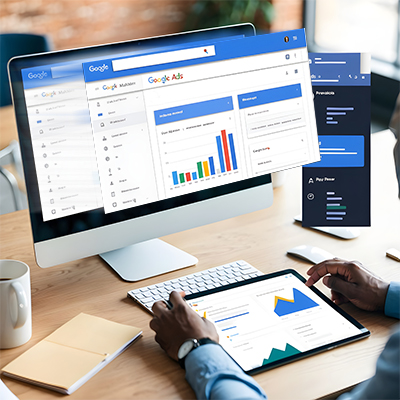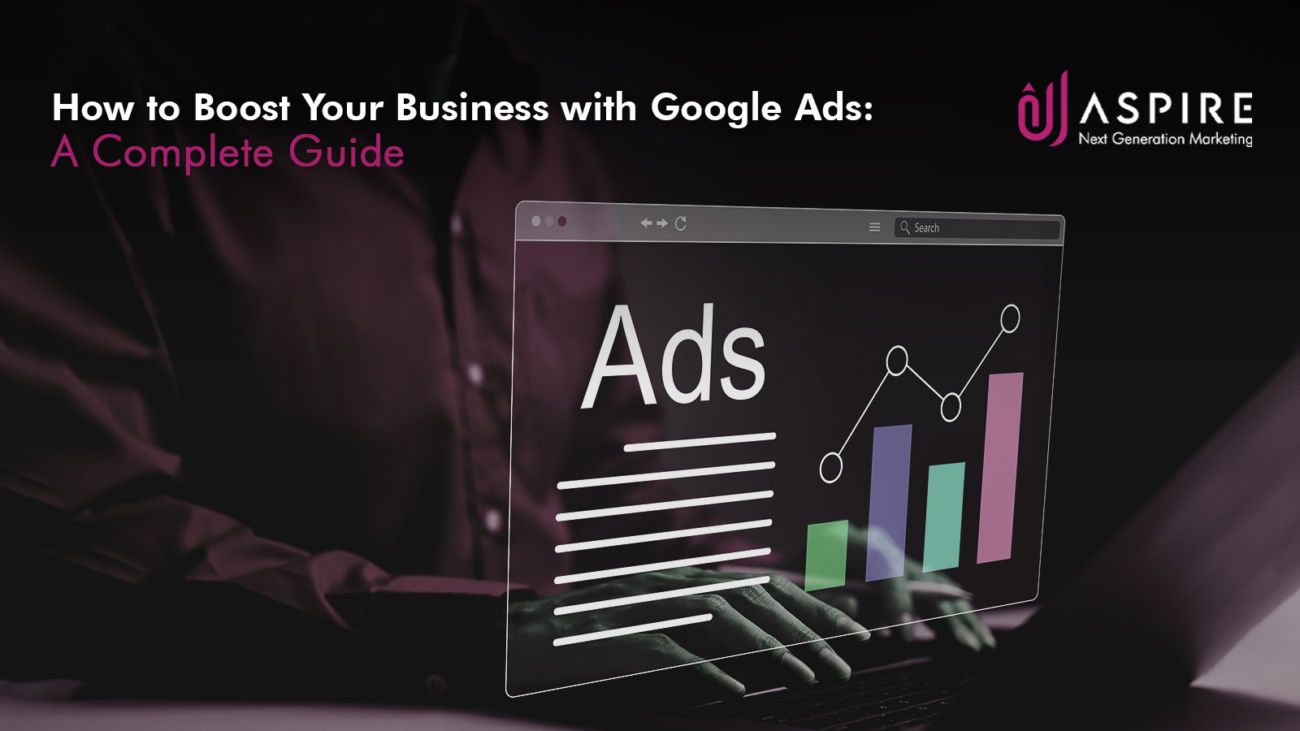Google Ads could help your business grow and attract more potential customers in a highly competitive market. If you follow through this full guide, then there is surely no chance that you never create a great ad campaign or choose the wrong inverse-optimized keywords and overpay for buying traffic which reduces the amount of revenue generated by your sales funnel per lead showing up on it. Whether you are a small business owner or an experienced marketer, this guide will give you all the knowledge to scale your campaigns with Google Ads.
Table of Contents
Understanding Google Ads basics
Speaking of digital marketing, Google Ads is, no doubt, the sure-shot winner in bringing websites to the top for their desired keywords. But for those who have never tried and tested the platform, it can be rather trickier to set up and choose from the whole set of options and features that it offers.
What is Google Ads?
Google Ads is the online advertising program by Google. With Google Ads, you will create online ads that highlight the products or services people are interested in, precisely at the time they happen to need them. You will have the ability to use Google Ads to advertise your business, help sell your goods or services, raise awareness, and drive traffic toward your website. With Google Ads accounts, you have the capability to create and edit an ad campaign anytime whether it is ad text, settings, or budget they are handled online.

Key Components of Google Ads:-
- Campaigns: A Google Ads campaign is a structured marketing initiative designed to achieve specific objectives, such as driving traffic or increasing sales, through targeted ads. It includes settings for budget, targeting, and bidding strategies, and encompasses multiple ad groups to optimize performance across various segments.
- Ad Groups: A campaign contains an ad group in Google Ads, comprising a set of ads and keywords that together can target a part of your audience. It essentially allows you to arrange related ads and keywords for better relevance and performance.
- Keywords: Google Ads keywords are specific terms or phrases that trigger your ads to appear when users search for those terms on Google. Selecting relevant keywords ensures your ads are shown to a targeted audience, increasing the likelihood of attracting interested and potential customers.
- Ads: In Google Ads, ad keywords are the specific search terms that trigger your ads to appear when users enter those terms. They play a crucial role in matching your ads with relevant search queries, driving targeted traffic and improving ad relevance.
- Bids: In Google Ads, bids are the maximum amount you are willing to pay for a click on your ad or for 1,000 impressions. Bidding strategies influence ad placement and cost, with options including manual bidding for precise control and automated bidding for optimized performance.
Setting Up of Google Ads Account
- Sign In: Log in to the Google Ads website using your Google account.
- Create Account: Click on “Start now” or “Create Account” and start the set-up.
- Set up Campaign: Choose campaign goals of sales, leads, and website traffic and select campaign type, whether it be Search, Display, Video, etc.
- Define Settings: Set budget, choose bid strategy, and pick targeting options like Location, Demographics, and Interests.
- Ad Groups: Create ad groups in the campaign by defining relevant keywords and organizing ads.
- Ad Design: Create the ad copy and design your ads to be able to correspond with your keywords and target audience.
- Set Up Billing: Fill in your payment information and set up your billing settings.
- Review and Launch: This is reviewing all your settings to make sure everything is correct, then launching your campaign.
Common Challenges And Solutions:-
Low Click-Through Rate (CTR):
Improve ad relevance-test variants of ad copies for better engagement. Ensure highly segmented audiences and precise, relevant keywords in your ads are targeted down to very specific audiences. Testing of different creative variations through A/B testing is able to help identify which messaging resonates best with audiences.
High Cost-Per-Click (CPC):
Optimize your landing pages, making sure ad copy relevance is boosting your Quality Score. Regularly revisit your bids and budgets to ensure you’re not overspending too much on underperforming ads. Employ ad extensions and compelling ad copy in order to improve CTR and quality.
Poor Conversion Rate:
Optimize landing pages and make them user-friendly. Too many times, a good conversion rate can be bad, owing to reasons including ad copy not in tandem with the offer irrelevant or poor landing pageing, inefficient call-to-action, and mismatch between audience targeting, among other things. In that case, improving the conversion rate necessarily will involve examining and optimizing these elements.
Creating Impactful Ad Campaign:
In the competitive world of digital marketing, crafting effective ad campaigns is essential to stand out and achieve your business goals. Google Ads offers a powerful platform to amplify your reach, drive traffic, and convert leads.
Why Google Ads?
Google Ads is a leading online advertising platform that allows you to reach potential customers precisely when they are searching for products or services like yours. With its extensive reach and sophisticated targeting options, Google Ads can be a game-changer for your business.
You want to drive sales: push for more direct purchases/ conversions.
- Behavior through Keyword Research
- Use Google keyword planner
- Analyze Competitors
- Focus on Long Tail Keywords
- Craft an ad copy
It is the first thing about your business that users will get to know.
Write compelling headlines:- Use strong and relevant keywords to clickbait.
Create Captivating “Shout out”:- Feature that stands you Above the Rest.
- Set a realistic budget: Decide upon the amount you can afford to spend each day and adjust the same based on your efficiency. Google Ads will let you decide a daily budget and bid for each keyword. The moderate budget should be increased once positive results are seen.
Target Your Audience Effectively:
- Geographic targeting: Focus on those locations where your potential customers are based. According to demographic targeting, it can be done by narrowing down to age, gender, and other demographic factors.
- Behavioral targeting: The users get targeted because of their interests and online behavior.
Tracking and Optimization of your campaign
Creation is just the first step; monitoring and continuous optimization are critically needed for better performance. Monitor CTR and CPC Test different ad copies to find out which works best, along with headlines and landing pages.
Refined bids, aside from updating your keyword lists for better results.
Learning from Analytics
Google ads provide you with analytics in detail, which gives you information on the performance of the campaign.
Identify Trends
Recognize which are pulling keywords and advertisements effectively, and which need an amendment
Optimize Ad Spend
Allocate your spending to the best-performing advertisements and keywords for maximum ROI.
Keyword research and optimization:
Within digital marketing, Google Ads has been one of the main traffic drivers and lead generation machineries. The bedrock of any successful Google Ads campaign is keyword research and optimization.

Why Keyword Research Matters
Keyword research basically covers thinking of those terms and phrases your potential customers use while searching for products or services like yours.
Improve Ad Relevance
Your ads will show up for searches related to your business
Better ROI:
Bringing in more quality traffic will drive better conversion rates and offer you a better return on ad spend.
Conducting Keyword Research:
- Plan ahead
- Google Keyword Planner
- One of the Example
- Keyword targeting
- Optimizing Your Keywords
- Add Keywords to the Ad Group
- Monitoring and Refining your keywords
- Track Performance Metrics
- A/B Testing
- Stay Updated
Levering Advance Technique
Utilize Broad, Phrase, and Exact Match Types: Google Ads offers different keyword match types:
- Broad Match: Shows your ad for variations of your keywords, including synonyms.
- Phrase Match: Displays your ad when the keyword phrase is matched in order.
- Exact Match: Triggers your ad only when the exact keyword is searched.
Enhance your ads with keyword-rich ad extensions like site links, callouts, and structured snippets.
Budget your success:
Every business company should own a website because this is important for the sake of expansion in the present era. But navigating the complexities of digital marketing can be challenging – especially when it comes to managing a budget. One budget might be all that separates a successful internet campaign from something no more than throwing your money down.
Why Budgeting is Crucial for Online Success
Budgeting for online marketing is not just setting aside a portion of your revenues; rather, it is an effective way of allocating your resources to reach certain business goals.
The budget can be set by:
Budgeting for online marketing is more than just setting aside a portion of your revenue. It’s about strategically allocating your resources to achieve your business goals.
Before you can start developing your budget, there’s a need to explicitly define your online goals. What do you want to achieve with digital marketing? Typical objectives include an increase in website traffic, lead generation, increase in sales, or improvements in the sphere of brand awareness.
Assess your current Digital resources
Take stock of your existing digital resources. This includes your website, social media profiles, email marketing tools, and any current digital advertising efforts. Assess the performance of these resources to understand where your strengths lie and where improvements are needed.
Determine your budget allocations
Once you have a clear understanding of your goals and resources, it’s time to allocate your budget.
Pay per click – Platforms like Google Ads and Bing Ads offer targeted advertising opportunities. Allocate funds to high-performing campaigns and keywords to boost visibility and drive targeted traffic.
Set Up tracking and analytics
Install tracking and analytics tools so you can measure success and manage your budget properly. PPC monitoring tools, social media analytics, and Google Analytics can all give you useful information about how well your online efforts are performing.
Tracking and improving ad performance
When it comes to the fluid realm of digital advertising, just going live with ads is not a given. Is your business really benefiting from online marketing? Only if you constantly monitor and optimize the performance of your ads. So if you want to make the most of your advertising spend without reducing marketing budget, effective tracking and optimization are absolutely essential.

Set clear advertising goals
Set clear and quantifiable advertising goals before going tracking & optimization deep mode. What kind of results are you looking for in your ads? By setting specific goals such as to increase website traffic or generate leads; track your performance, and evaluate the results.
Refine target strategies
.Effective targeting is essential for reaching the right audience and maximizing your ad spend. Review your targeting settings and make adjustments based on performance data:
- Keyword Targeting: Analyze which keywords are driving traffic and conversions. Add high-performing keywords and consider excluding underperforming ones.
- Audience Targeting: Utilize demographic, interest, and behavioral targeting to reach specific audience segments. Adjust your targeting based on which groups are converting most effectively.
- Geographic Targeting: Optimize your ad spend by targeting regions where your ads perform best.
Monitor and adjust bidding strategies
- Manual Bidding: Allows you to set individual keyword bids. Adjust bids based on performance to ensure you’re spending wisely.
- Automated Bidding: Google Ads offers automated bidding options like Enhanced CPC or Target CPA, which optimize bids to achieve specific goals. Monitor their effectiveness and adjust your targets as needed.
- Bid Adjustments: Make adjustments based on factors such as device, location, and time of day to optimize your ad spend.
Optimizing Landing Pages
The landing pages are the base for converting ad traffic into customers. Optimize Your Landing Pages for Good User Experience and Conversion.
- Relevance: Linking your Ad with appropriate & relevant Landing Page content, to give a consistent user experience.
- Design: Built with a minimalistic design that is easy for users to consume and navigate + call-to-actions
- Speed: Ensure that your landing pages do not have a high-speed loading time, as you may lose potential clients who leave the page out of impatience.
CONCLUSION
Achieving your marketing goals and growing your business online depend on monitoring and optimizing ad effectiveness. You may make the most of your advertising budget and get significant results by establishing specific objectives, making use of thorough tracking tools, perfecting your targeting and ad language, and iteratively improving your tactics. Adopt these strategies, maintain your flexibility, and observe how your business and internet presence grow.
Read more: Measuring ROI for business: An ultimate guide for business owners
FAQ
Why Google ads are important for business?
It is very important to run Google Ads for businesses, considering this is a way of availing visibility to targeted customers who have actual searches for related products or services, driving immediate traffic to websites, and sometimes even providing measurable results through rich analytics. This gives them the power to bring about higher conversions and optimize their marketing budgets effectively.
Which is best google ads or Facebook ads?
It comes down to your objectives: between Google Ads and Facebook Ads, which one you choose depends on that. Google Ads are very much more capable of gaining high-intent search traffic and thereby more suitable for immediate conversions. On the other hand, Facebook Ads will be able to give better targeting options to build brand awareness and user engagement based on interest and demographics. The best combines both to take full leverage over each other.
How do Google ads work?
In Google Ads, advertisers can create targeted adverts that will appear in Google search results and across the websites of publishing partners. The process involves bidding on keywords associated with their products or services; thus, ads will appear based on user searches and set targeting criteria. The cost is to be determined by every click-PPC or per a thousand impressions-CPM, although comprehensive analytics make sure performance can be closely monitored and optimized.

